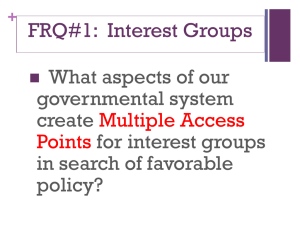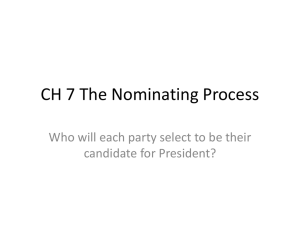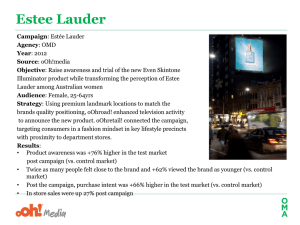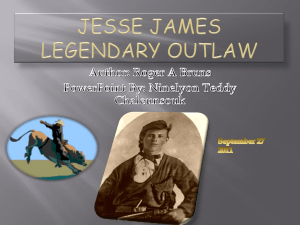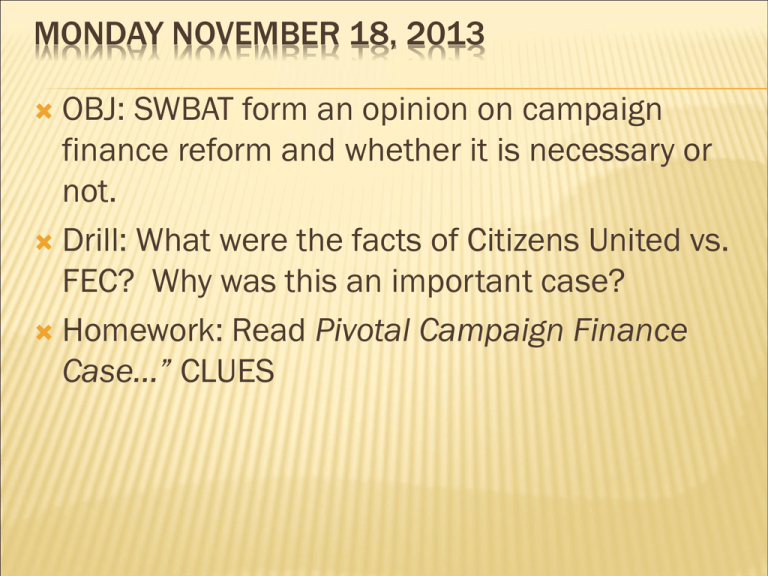
MONDAY NOVEMBER 18, 2013
OBJ: SWBAT form an opinion on campaign
finance reform and whether it is necessary or
not.
Drill: What were the facts of Citizens United vs.
FEC? Why was this an important case?
Homework: Read Pivotal Campaign Finance
Case…” CLUES
CURRENT EVENTS
Four presenters.
AGRREE OR DISAGREE
Write an A for Agree or D for disagree for each
scenario.
Watch the short video clip, Does this seem like
a campaign ad, or an example of First
Amendment Rights? Why
© 2010 Hogan & Hartson LLP. All rights
reserved.
4
DECISION IN CITIZENS UNITED V. FEC
In Citizens United v. FEC the Supreme
Court struck down as unconstitutional
under the First Amendment federal
statutory prohibitions on “independent
expenditures” by corporations and labor
organizations.
Essentially, the Court’s ruling permits
corporations and labor organizations to
use their treasury funds to make
independent expenditures in connection
with federal elections and to fund
electioneering communications.
© 2010 Hogan & Hartson LLP. All rights
reserved.
5
DECISION IN CITIZENS UNITED V. FEC
However, the Supreme Court’s decision did continue the
Supreme Court’s 1976 distinction, in its decision in Buckley v.
Valeo, between constitutionally impermissible regulation of
election “expenditures” and constitutionally permissible
regulations of “contributions.”
The Court in Citizens United also upheld the validity of federal
law disclosure and disclaimer requirements applicable to
election-related advertising by corporations and unions. These
disclosure requirements will now apply to advertising by
corporations and unions that is permitted as a result of this
opinion.
Currently, organizations spending more than $250 with respect
to a given election in a calendar year on election-related ads
must report those expenditures to the FEC on FEC Form 5.
WHAT CHANGED
© 2010 Hogan & Hartson LLP. All rights
reserved.
6
This decision allows corporations (and labor unions) to fund,
directly, independent media communications (including, but
not limited to radio, television, internet, and mail) expressly
advocating the election or defeat of federal candidates.
Example – “Vote for Obama” or “Defeat Obama”
Broad Impact – The same First Amendment analysis applies
equally to state and municipal statutes that similarly prohibit
corporate expenditures advocating the election or defeat of
state candidates, including judicial candidates in those states
that elect judges.
All corporate independent expenditures must be truthfully
disclosed to the FEC, subject to civil or criminal penalties.
© 2010 Hogan & Hartson LLP. All rights
reserved.
7
WHAT DIDN’T CHANGE
Direct corporate or union contributions to
federal candidates or federal party
committees remain prohibited.
While
the First Amendment distinction between
permissible “expenditures” and prohibited
“contributions” is somewhat artificial, the Court
has long recognized such a distinction since its
seminal 1976 decision in Buckley v. Valeo.
Public Communications by corporations that
are coordinated with candidates and parties
remain prohibited.
© 2010 Hogan & Hartson LLP. All rights
reserved.
8
IMPACT ON CORPORATE PACS
Although the statutory requirements and FEC
rules were not changed by the holding, there is
a practical impact.
Because corporations can spend money
directly on electioneering communications, one
permissible use of the PAC (electioneering) can
now be accomplished outside the PAC and
outside the restrictions on PAC fundraising and
© 2010 Hogan & Hartson LLP. All rights
reserved.
9
PRACTICAL IMPLICATIONS
A corporation (and labor union) for the first
time can communicate with the public, directly
through any media, at any time, in support of
any federal candidate.
Direct corporate (and labor union) contributions
to federal candidates and federal committees
remain prohibited. Such contributions can be
made by individuals or a PAC.
Many corporations and labor unions may revisit
the use of a corporate PAC.
TWO SIDES OF CFR
Read your article.
Make
notes in the margins or another sheet of
paper
Be prepared to defend your article’s position in a
small group discussion
You will be placed with 3 other people, 2 with
different articles one with the same.
Discuss each point, vote on whether you think your
author has the correct argument and why.
TUESDAY NOVEMBER 19, 2013
OBJ: SWBAT understand why
Campaign Finance Reform
was introduced and the
argument that continues
about it today by examining
the Bill through multiple
perspectives.
Drill: What trends do you
see in this chart for feelings
toward CU vs. FEC?
Surprised?
Homework: Wilson 270-283
Cornell Notes DUE
THURSDAY NOVEMBER 21
WHAT YOU NEED TO KNOW ABOUT
CAMPAIGN FINANCE
FEC – Federal Election Commission
BCRA – Bipartisan Campaign Reform Act
Hard money = Federal money
Political
donations raised from federally permissible
sources within the limits established by BCRA
Soft money = Nonfederal money
Political
donations made in such a way as to avoid
federal regulations.
PIVOTAL CF CASE
What did the article predict will happen after
this case?
Why do they think so?
Is this a good or bad thing? Explain.
OVERVIEW HISTORY OF CAMPAIGN
FINANCE REGULATION
Beginning of time—Civil War: No regulation
Civil War—1910
Gilded Age
Exceptionally scandalous politicians nationally
1868: 75% of money used in congressional elections through party
assessments
1867: Naval Appropriations Bill
Boss Tweed
First federal effort to regulate campaign finance
Aimed at stopping the political shakedown naval yard workers for
political contributions
Prohibits officers and employees of the fed. gov’t from soliciting
contributions
1883: Civil Service Reform Act (Pendleton Act) prohibits the same
solicitation of all federal workers
www.mit.edu/~17.251/finance.ppt
OVERVIEW HISTORY OF CAMPAIGN
FINANCE REGULATION
Corrupt Practices Acts of 1911 and 1925
Set
disclosure requirements for House and
Senate Elections
Spending limits ($25k for Senate; $5k for
House)
Ridiculously weak and regularly violated
1971 Federal Election Campaign Act (FECA)
1976: Buckley v. Valeo (1976)
www.mit.edu/~17.251/finance.ppt
BUCKLEY V. VALEO
Buckley v. Valeo, (1976), was a case in which
the Supreme Court of the United States upheld
a federal law which set limits on campaign
contributions, but ruled that spending money to
influence elections is a form of constitutionally
protected free speech, and struck down
portions of the law. The court also stated
candidates can give unlimited amounts of
money to their own campaigns.
CAMPAIGN FINANCE REFORM AND
BUCKLEY I
Original Provision
Effect of Buckley v. Valeo
Expenditure limits
Overall spending limits (Congress and
president)
Struck down partially
(freedom of speech)
Limits on the use of candidates’ own resources
Struck down entirely
(freedom of speech)
Limits on media expenditures
Struck down entirely
(freedom of speech)
Independent expenditure limits
Struck down entirely
(freedom of speech)
www.mit.edu/~17.251/finance.ppt
CAMPAIGN FINANCE REFORM AND BUCKLEY
II
Original Provision
Effect of Buckley v. Valeo
Contribution limits
Individual limits: $1k/candidate/election
Affirmed
PAC limits: $5k/candidate/election
Affirmed
Party committee limits: $5k/candidate/election
Affirmed
Cap on total contributions individual can make to Struck down (freedom of
all candidates ($25k)
speech)
Cap on spending “on behalf of candidates” by
parties
Affirmed
www.mit.edu/~17.251/finance.ppt
FEDERAL ELECTION COMMISSION
Purpose
In 1975, Congress created the Federal Election Commission
(FEC) to administer and enforce the Federal Election
Campaign Act (FECA)
the statute that governs the financing of federal elections.
The duties of the FEC, which is an independent regulatory
agency, are to
disclose campaign finance information
enforce the provisions of the law such as the limits and prohibitions
on contributions,
oversee the public funding of Presidential elections.
FEC RULES & REGULATIONS
THE PLAYERS
Government
Campaign Committees
PACs connected to corporations, unions, etc.
Nonconnected Committees
Candidates
National Party Committees
State & Local Party Committees
Separate Segregated Funds
FEC – Federal Election Commission
All other PACs
527s
Individuals
VARIOUS ELECTION LAW
Federal Election
Campaign Act (FECA)
1975
Bipartisan Campaign
Reform Act (BCRA)
2002
Major changes under
BCRA
MCCAIN FEINGOLD 2002
The Bipartisan Campaign Reform Act (BCRA) of
2002, also known as "McCain-Feingold," after its
sponsors, is the most recent major federal law on
campaign finance, which revised some of the legal
limits of expenditure set in 1974, and prohibited
unregulated contributions (called "soft money") to
national political parties. ‘Soft money’ also refers
to funds spent by independent organizations that
do not specifically advocate the election or defeat
of candidates, and are not contributed directly to
candidate campaigns.
WHAT DOES FEDERAL ELECTION LAW
REGULATE?
In General
The financing of federal
elections
Specifically
Disclosure of financial
activity
Contributions
Receiving and Giving
Expenditures
Candidate support activities
Federal election activities
TYPES OF MONEY
Federal Funds
Collected
from permissible sources
Subject to contribution limits
Levin Funds
For
state and local party committees only
Collected from any entity except fed cand.
Only used for certain types of FEA
Nonfederal Funds
Subject
to state law only
May be used to pay for expenses related to not
federal elections
HIERARCHY OF MONEY
STATE PARTIES
Federal Money
Federal
“Hard Money”
Levin
Quasi-Fed $
Levin Money
Fewer limitations
Some Federal election
activities, state and local
State Money
State
“Soft Money”
Most limitations
Federal, state and local
elections
Typically, fewest limitations
State and local elections
only
WHERE DOES MY MONEY GO?
It depends!
Candidate
Candidate specific activities
Contributions to other
candidates, parties or causes
DNC/RNC
Federal candidates
Allocated nationally
State Party Committees
Federal, state & local
candidates
Allocated statewide
PACs
Support candidates, parties
that agree on specific issues
527s
Separate campaign
CAMPAIGN FINANCE: SOFT MONEY AND
HARDBALL POLITICS
You will be examining positions on Campaign
Finance:
You
will be divided into groups and assigned a
number of questions.
As a group discuss these and decide on your
position/answers for each.
Select one member of your group to present your
results to the class.
WRAP UP RESPONSE
Using
what you know about CFR,
the First Amendment, and the US
Government decide: Does the
government need to regulate
Campaign donations? If so why,
and are they doing a good enough
job?
Use specific examples.
WRAP UP
Based on your discussion does the First
Amendment allow for a loophole in Campaign
Finance? How so?



